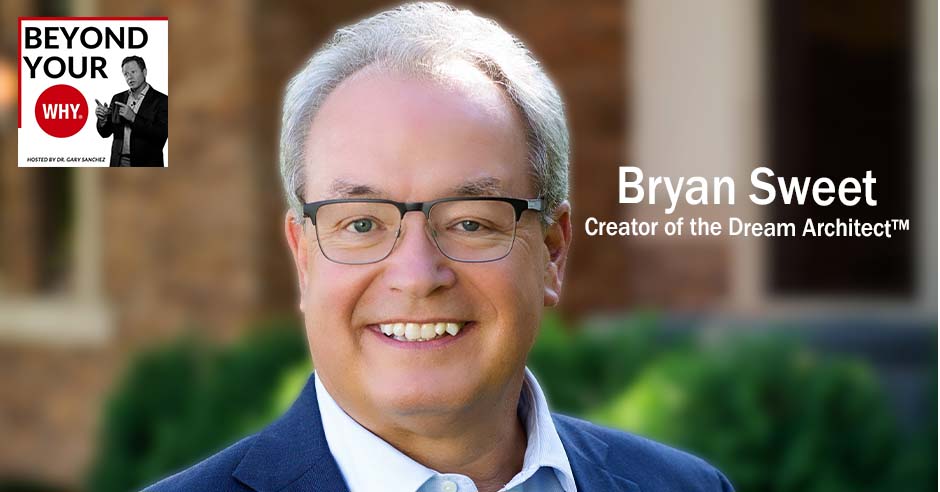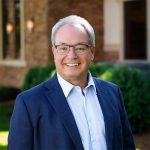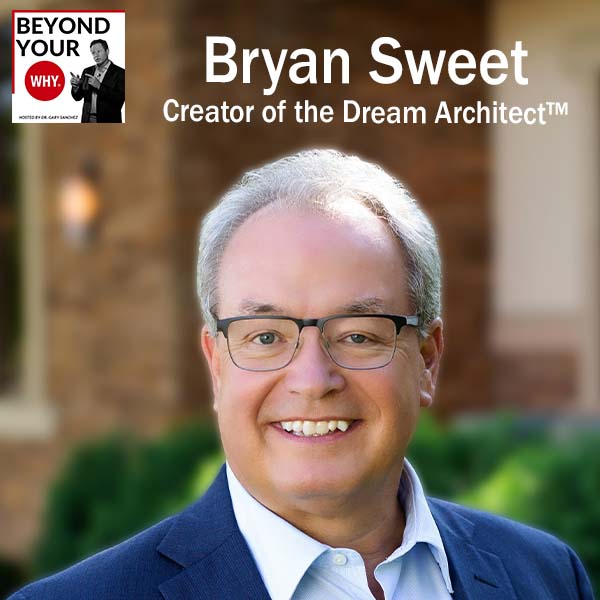
Are you often pleased but never satisfied? Are you constantly looking to improve on things so that they can end up better? Do you want people to succeed in their lifelong dreams, so you help them achieve them? If you said yes to all those things, then just like the guest today, Bryan Sweet, whose WHY is the WHY of better way. Bryan achieves his WHY by helping his clients find better ways to help them achieve their financial goals and dreams.
Bryan is a Forbes Best-in-State Wealth Advisor, wealth advisor at Sweet Financial Partners, and the creator of the Dream Architect, where he helps people live their ideal futures. Join Dr. Gary Sanchez as he talks with Bryan about Dream Architect and how to fulfill your dreams. Discover all the financial and mindset planning involved to make your goals a reality. Start envisioning your future today!
—
Watch the episode here
Listen to the podcast here
Finding Better Ways To Help People Achieve Their Dreams With Bryan Sweet
In this episode, we’re going to be talking about the Why of a Better Way. If this is your why, then you are the ultimate innovator. You are constantly seeking better ways to do everything. You find yourself wanting to improve virtually anything by finding a way to make it better. You also desire to share your improvement with the world. You constantly ask yourself questions like, “What if we tried this differently? What if we did this another way? How can we make this better?”
You contribute to the world with better processes and systems while operating under the motto, “I’m often pleased but never satisfied.” You are excellent at associating, which means that you are adept at taking ideas or systems from one industry or discipline and applying them to another, always with the ultimate goal of improving something.
I’ve got a great guest for you. His name is Bryan Sweet. As a Forbes’ Best-in-State Wealth Advisor for multiple years running, he has been on the mission to help people live their retirement dreams since the start of his career in financial services back in 1979. It is because of this that he created his proprietary, the Dream Architect, which not only helps his clients maximize their distribution, planning, and retirement but also helps them strive for and accomplish their biggest dreams.
With Bryan’s vast industry experience, he has also partnered with multiple entities, including Ultimate Advisor Coaching and the Elite Wealth Advisor Symposium, which support high-performing financial advisors across the United States in the growth and scaling of their businesses. He and his partners do this through teachings on team management, marketing and automation, best practices, and all that it takes to build a high-class and scalable advisory practice. The bottom line is that Bryan thrives on helping others experience the growth and freedom that he has created and building world-class financial services, all while living the life of his dreams. Bryan, welcome to the show.
It’s great to be here. Thank you.
This is going to be a lot of fun. I’ve been looking forward to this. Let’s go back to your life. Take us back to what were you like in high school.
My nickname used to be Hyper. That might give you a little background on how I might’ve been in school. I was always pretty active in everything I did. I couldn’t sit still very long. I think about myself and the things that I do. It applies now. I’m not willing to just keep the status quo. There are probably early people predicting what direction I might go.
Give us an example. What were you hyper about in high school? What are some of the things that you did while you were in high school to give us a sense of this?
[bctt tweet=”Children have these big aspirations, whether it’s to be an astronaut or a fireman, but then life happens. And these people just end up letting life happen to them instead of making it happen.” username=”whyinstitute”]
I was like Eveready Bunny. I was always going somewhere or doing something. I never slept a lot, and I still don’t. By how I was acting and what I did all the time, that’s the nickname that my friends gave me.
Were you into sports or drama? What were the things that you liked to do in high school?
I wasn’t a great athlete, but I was a wrestler, and I was in football. One of the things I loved to do was weightlifting. I was the captain of the weightlifting team. For whatever reason, I happened to maybe excel at that. I liked that probably more than anything else. I was also pretty good in school. I had fun with my other buddies, but I always made sure I got my homework done. I got through school well.
Where did you grow up?
Where I went to high school, I still live now. It’s a little town in Minnesota called Fairmont, Minnesota. The population is a whopping 10,000. I always liked to tell people that if there are two people at the stop-and-go lights, that’s a traffic jam, but it’s been a great little community for myself and all my business people. We’re very fortunate with technology that we can work with clients in 35 different states and 4 different countries.
For those of us that didn’t have that opportunity and never will, what was it like to grow up in a town of 10,000 people? How many high schools? Have you felt like you knew everybody?
We had a close class. We had 1 high school and 1 elementary school. Everybody knew everybody. There was like a typical high school, the East side, West side, North and South where you can have little cliques. Fortunately, I’ve always seemed to be somebody that got along with everybody. That turned out to be helpful in relationship building later on. As I thought back to where it started, I thought that there was nobody better than anybody else. Everybody had some value to add. It’s good to get to know and be friends with as many people as you possibly can.
We have a great little town. There are five lakes right in the town. There are lots of activities. In the summer, we went swimming and did outside activities. Being from a small town, it’s helpful from a business standpoint because if you do good things, word travels fast and consequently, if you don’t do things well, the word travels fast. It was a great experience. I’m still friends and business acquaintances with a lot of my high school friends.

Where did you go to college?
I must get lost easily because I don’t travel very far. I went to a division of the University of Minnesota in a town called Mankato. Back then, they used to call it Mankato State. It was 50 miles away from Fairmont, but it was a great big state school and gave me some flexibility to come back to work in the summers without traveling very far. I took up Business and a Minor in Accounting when I was in college. One of the great things looking back at what get started is that my college advisor was in charge of the marketing department. He was voted the number one teacher for like three years in a row. He’s the one that got me in my career while I was still in college.
How did you do that?
I was taking all the Business classes and Finance. I loved Accounting and numbers. I was going to minor in Accounting. I couldn’t figure even with his help what I wanted to be when I graduated. Fortunately, looking at it now, my mom would have told you this was the worst decision ever when it happened, but he was also the division manager for a life insurance company.
He said, “As long as you don’t know what you want to be when you grow up, why don’t you consider selling life insurance? If nothing else, it’ll be great teaching and experience. You’ll learn lots of skills. Not knowing any better, I said, “Let’s give it a shot.” It was the first time I told my mom. Dick came down to tell my mom. I thought she was going to have a heart attack and pass out. Fortunately, it all turned out well.
What did she not like about it?
If you think of the standard stigma of a life insurance person, that’s the one guy where you see them at a party. There’s no one talking to him because they’re afraid you’re going to get sold something. That was her stigma, originally, but looking back, he was so instrumental in teaching me skills that I needed so much and still use now, even to the extent I learned how to tie my first tie with him. He gave me lots of introductions and spent a lot of time with me. Ultimately, it turned out his whole family are clients of mine now. It was like the reverse of the whole thing. He helped me and now I’m helping them.
You’re at college. Your advisor gets you moving in the direction of life insurance, you graduate, then what happens?
[bctt tweet=”In life insurance, you don’t work for insurance companies; you work for your clients.” username=”whyinstitute”]
I stayed in the insurance business and there was an opportunity through some relationships that he had started where I opened an office in Mankato. I started while I was still in my senior year of college. Whoever would talk to you, your college buddies, family, and friends, I continued that for 1 year or 2 up there then I said, “Where do I want to spend my time? This is going pretty well.” I was doing pretty good. Ultimately, I said, “I know a lot more people in Fairmont. Maybe I should move back to my hometown because the opportunities are probably greater there just because of the people that I’ve known over the years.” I made the gradual transition back to Fairmont.
Did you add the financial piece to it or how did that happen?
I was working for an insurance company. As I got more technical knowledge and understanding, started talking to clients, and learned a lot more about the industry, I quickly became familiar with that one company that didn’t have the best products and vehicles for every situation that I came across. I’m going, “Whom do I work for? Do I work for the insurance company or my clients?” I quickly and rightfully answer that question correctly. I said, “I work for my clients.”
Shortly thereafter, I said, “I have to become independent and be able to represent any company that’s in the best interest of my clients.” It was a natural progression. Clients were asking certain things. Way back when I started, the old investment industry was mutual funds. They used to charge 8.5% upfront commissions. It was a crazy thought back then.
People were asking questions, so I slowly got into that and then ultimately did a lot less insurance simply because I didn’t have a lot of control over the underwriting and who can get accepted, but I had all the control over all of the financial planning sides. We naturally gravitated to the areas where we could be the most helpful and we had the most control.
You’ve found a better way to help people with their finances and their planning. How many years ago that you make the switch from focusing on insurance to focusing more on financial planning?
I started in 1979. Maybe eight years into my career, I opened up my own individualized office. At the time, it was called Sweet Financial Services and later became Sweet Financial Partners. That would have been in 1987.
Tell us about the Dream Architect.

I’m in a mastermind group called Strategic Coach. I have been in that for 23 years. If you’re an entrepreneur, you probably have heard of Dan Sullivan. He helps you create a better way of thinking as a business owner. Part of that class was, “How do you differentiate yourself? How do you show up differently with your clients?”
Many years ago, we were doing an exercise of trying to take what you did and create a process, name, steps, and whatnot. I’ve always been fascinated with dreams, motivational things, and talking to clients. One of the things I noticed is that when you’re a young kid, everybody wants to be an astronaut and a fireman. Everybody’s got these big aspirations, and it then seems like life happens.
A lot of times, people, for whatever reason, just let life happen to them instead of making it happen. I thought, “If we can make, as part of our process, something to help their dreams come true wouldn’t that be extra helpful and also be a differentiator?” We created the platform, which we’ve now trademarked and called Dream Architect. It’s all about all the financial planning concepts but also creating your vision for what you’d love your future to be and helping people think a lot more out of the box.
Give us an example. How do you define a dream? That sounds interesting. How do you help someone to find what we are talking about? Where do they want to be at the end of their life? Are you talking about where they want to be when they retire? What are we talking about?
It would be all of those things. It’s essentially a four-step process. The most important part of it is step one, which is called visioning, where you sit down and we have a conversation about, “If anything in life were possible, what would you like to see happens? What are the problems and issues that you’re dealing with now? What are your dangers? What are your opportunities?” Try to get as much information about pressures and concerns that they have, but also spend a lot of time on the what if or the bucket list of, “If anything were possible, what would you like to do?”
The first time we started asking those big picture, dreaming, and if anything were possible questions, people would glaze over because no one had ever asked them, but they’d never thought about it. They are going to go to work and raise a family. Whatever happened is what happened. I am a believer in it because I’ve had these things happen to me what you think about and what you put in your mind, things are going to pop up and help you get there.
I’m trying to get people to think about where they would like to be. I want to be a constant reminder and a source to help them get there because if they’re thinking about it and at our reviews, I’m thinking about it when I can bring the resources to them, or they’ll start seeing things that help bring those things to fruition. It’s learning as much as possible. It’s an ongoing thing because, for a lot of people, it’s a little woo-woo, to begin with, “What are you even talking about?”
Once we have a good idea of what would make their life utterly fantastic, then step two is we need to put a blueprint together on how we’re going to get there. These are all the different methodologies and steps. It could be anything from tax planning to introductions to different individuals that we collaborate with that might provide other services. Create the blueprint.
[bctt tweet=”Experiences of any type are the things that people remember.” username=”whyinstitute”]
Once we go through the blueprint with them and they’ve said, “That’s good. I’d love that. Let’s tweak this one a little bit.” It’s like building a house. You might change the design a little bit once you see the blueprint. We’ll finalize the blueprint and then we’ll go through the build process, which is making what they said they wanted on the blueprint come to life.
After we’ve made it come to life, then it’s constant ongoing maintenance. Otherwise, review it to make sure, “Are these the things that you still want to do? Are these still the timeframes? If anything has happened, what do we need to do to tweak it so you’re always on schedule? If something changed, what do I need to do to make sure I take that left turn instead of going straight so that I’m always on track for whatever’s important to me?”
Those are the four steps that we use, but it’s customized to them. We have a big emphasis on lots of questions about getting them to think about their ideal future, not only what’s the ideal future tomorrow, in retirement, or in any of those timeframes. Those are seemed to be things that people don’t normally get asked.
The four steps were you got to do the visioning. Once you envision it, you got to create the blueprint. The third step is you got to build the process. The fourth step is you got to maintain it and review it. I’m sure people are thinking this. What is the most fascinating vision you’ve heard that you’ve helped create?
We tried to collect these. When you walk into the office the first time, there’s a wall before you get to the office. It says, “It’s your dream, and we’ll help you get there.” It’s pictures of clients’ actual dream accomplishments that we’ve helped create over the years. It’s a constant reminder. We have a little story tour that goes with that when we get first introduced to people. That’s an integral part of introducing the Dream Architect process.
As far as the most outstanding one, the one that rings a bell is, I had some clients that were retiring and they’ve been disciples of what we do and been long-term clients. We took them through this process. We created a dream board for them. One of the things that they did is every time they went somewhere or did something on the dream board, they took the dream board with them when they traveled. They’d take a picture and they’d send it to us from wherever they were doing it.
That particular couple wanted to do a Route 66 trip with their grandkids. She wanted to write a book. There was a foundation that they wanted to create and all of which they got accomplished. The reason these people ring a bell is what happened is her health took a bad turn and she ended up with a brain disorder and things weren’t very good.
The rewarding thing for us and also for them is because they went through the process, they got everything done on their dream list prior to that happening. They could look back favorably. Now she’s fortunately recovered in doing much better, but not in the condition where they can go out and do lots of other things that might’ve been on the list that didn’t get accomplished. That’s probably the one that jumps out at me the most just because what happened after that forced them to, hopefully, continue to do well, but they wouldn’t have got anything else probably done on the list.

What are some typical dreams that you hear? Are there patterns to dreams? Are there similarities between what people say? I’m trying to think of myself from myself, and I’m sure readers are thinking in their own minds, “What would my dreams be? What is it that I haven’t done that I want to do?”
We are trying to create an even better list of questions to get people to even think deeper. It’s a lot of family-oriented things on how to help family members accomplish something. Vacations of some exotic form tend to pop up a great deal. What I found is that experiences of any type are the things that people remember. I remember one client. We had a review. I was chatting with her. I could tell she was usually this upbeat and happy-go-lucky person. She was a little down.
I stopped the conversation and said, “Is something going on? I can tell you’re not your normal self.” She says, “I got off the phone with my son.” She’s got three children. They were going to do this big family trip with all the grandkids. She said, “I had to tell him no because I didn’t feel comfortable affording that.” I went, “What do you mean? You never even brought this up.” I stopped the conversation and we use detailed financial planning software that plugs in all the numbers so we can quickly decide whether you can have this expense or that expense. I had all her updated information and I applied the cost of what this trip would be. I said, “You can do this.”
All of a sudden, her whole demeanor changed. While we were on the phone, we got her hooked up with the travel people, the airlines. This happened a few years ago. Her name’s Kathy. The first thing she says every time I talk to her is, “Thanks again for making sure I did that family trip because it’s an experience that I’ll never forget and never be able to repeat again because the kids get older and not everybody can get together.” It’s things like that. It’s gratifying to me, but also, I need to get better at drawing those things out of them. I’m finding that people can think bigger and better, but I’ve got to be somewhat of a better motivator to maybe make that happen.
Those are hard conversations, but they’re just things that we don’t ever think about. We’re doers and not thinkers so often. Have you seen that dreams have changed over the years? Have the things that people dreamt about changed or has it been pretty standard?
I saw four additional issues that continuously popped up after we’ve been doing the Dream Architect for a long time. They weren’t being solved in the regular Dream Architect process. We helped those four items with all the wealth and creating things for their kids, vacations, and whatnot, but several things popped up. The first one that I continually noticed was a dealt with purpose.
Where this applied was somebody that maybe was a business owner or a high-level executive and they’re retiring. Their whole persona is of this business owner, all the people they helped, and their clientele. All of a sudden, they are going from that to something different. In a lot of cases, they really didn’t know what they were going to do or hadn’t thought about it. That transition, in a lot of cases, didn’t go well. They didn’t know their why, which is applicable to this show. We wanted to be helpful with that.
The other thing that we noticed in the example I gave earlier, people ran into health and longevity issues. They had all this money and then something health-wise happened and/or their lifespan is going to be shortened. I said, “Which can we be doing or who can we be collaborating with to help them understand things that they can do to help with that?”
[bctt tweet=”Half of the joy of being charitable is seeing the good for yourself.” username=”whyinstitute”]
The third one would be legacy, which is helping maybe pass values down to the next generation or their grandkids or their kids. Part of that would also be that we ran into a lot of clients that wanted to be charitably inclined, but they were just nervous about doing it while they were living for fear they might run out of money. The problem with that is that if you do it after you die, you don’t get to see all the great benefits that you were able to deliver. Half of the joy of being charitable is to see the good in yourself. It’s to try and create better methodologies to get people to understand that maybe you can have your cake and eat it, too. What are some of the different methodologies?
The last one was experiencing. A lot of business people, or just people in general, work, go home, eat supper, go to bed, work, and never got to maybe do as many vacations or experiences as they would’ve liked. Even if they had the ability and understood, maybe they were such unique ones that they didn’t know how to go about, who do you find and who can help me with that?
They consequently never got done. Because of that, we’ve taken the Dream Architect process and we’re creating a new platform called The Dream Architect Life that has all five of those pillars, wealth, purpose, health, longevity, legacy, and experiences all together so that we can help control the concerns and other things that we didn’t see getting done. I’m not the one delivering the experiences and things, but we are collaborating with people like yourself and others that are experts in those areas and making people aware of, “If I’ve got this issue,” these are people that can help you overcome that to make that negative, turn it into a positive.
We’re going to be creating a three-day immersive where you can come to the event. We’ll talk about all five areas. We’ll do a deep dive into one particular topic. The first one we’re going to be doing is going to be health and longevity oriented. From my standpoint of, “How do I help propel and make more of these dreams come true?” it seems like that direction is going to be helpful and maybe make it more available to more people also.
What is it that you believe about dreams?
I’m very much a believer that dreams do come true, but you do have to have them in front of mind. What you think about is what happens. I’ve just personally experienced it so many times. Your brain doesn’t know the difference between any input that you give it, but its job is to go out and find resources for whatever you’re thinking about. If you’re thinking about positive things, dreams, and a better life, those things pop up because your brain is looking for that information.
When you’re looking for it and it shows up, if you’re receptive to it and then take the action steps, that’s where we’re helpful. If you’re not seeing it, we may have already known what that step is. If I know it, maybe we’ve already experienced it or had a client experience it. I can say, “This is the next step that you need to take to make that thought from a thought to a reality.”
We had talked about this one time before when I was at a gentleman’s house who is a billionaire in Palm Desert and he had this room. It was 360 degrees of glass. It was like you were standing in a glass room on top of this hill, overlooking Palm Desert. He had miniatures of the number one dream home in the world, the number one dream yacht, the best of the best that you could possibly have. I asked him, “Do you ever use this room?” He said, “ I only go in that room when I want to dream. Dreams are the most important thing that you have.”

That’s taking that concept to another level in that example.
He started as a newspaper salesman and built his way all the way up to owning a quarterly in Idaho and lots of different things. It all happened because of his ability to dream. Most of us throw dreams on the back burner. We don’t even consider how valuable a dream is.
The other point is if you think about it, a lot of times you may have a dream, but then you let somebody poo-poo it like, “What do you mean? Do you want to do that? That’s ridiculous.” It’s not ridiculous. You just don’t want to be hanging out with that person anymore because they’re going to be the Debbie Downer that makes it not happen. You and I know lots of successful people and the same story comes out, “Whatever you think can happen.” You can create your own possibilities. You can’t be around people that don’t have that same mentality.
You got to be conscious when you want something in life or you have a dream. If somebody is telling you, you can’t, not that you can permanently get rid of them because it might be a relative or something, but don’t spend a lot of time with them when you are trying to accomplish something bigger. That’s such a huge thing. There are so many naysayers in the world that can squelch that, but there are also a lot of people that want you to win. Those are the ones that are going to be the most helpful.
Do dreams have a timeframe on them or a deadline? How do you separate dreams from a wish?
To a certain extent, you can create your own timeframes with dreams, but obviously, you got to be realistic about it, “I want to be a multimillionaire tomorrow.” That’s not going to happen, but if you understand the actions you need to take and you’re willing to accept the input that will continually come when you have that as your framework, it will happen.
What also happens with people is they give up a little too soon, maybe the right time perspective. That filters away because they gave up and then they’re not it’s not front of mind anymore. I see that a fair amount. One of our roles is to be 1) The reminder. This is important to you. 2) The encourager and 3) Be the constant supplier of background information that helps them get to where they want to go.
What I have found is that the more I talk about a dream, the easier it becomes to talk about, the more likely it is that it is on its way to happening, and the more that other people know about it and then want to be part of it. I remember the first time I thought about impacting 1 billion people, helping 1 billion people discover their why, how, and what so they can make decisions and live a life of passion.
[bctt tweet=”When you want something in life or have a dream, don’t be around people who are telling you, you can’t.” username=”whyinstitute”]
When I first said that, I see people looking at me like, “What?” The more I’ve talked about it, the more obvious it has become that it’s going to happen. The more people that have said, “I want to be part of that,” and introduced me to the right people to make it happen. If I stopped saying it and only kept it internal, it wouldn’t happen. I wouldn’t have the help to make it happen.
I will compliment you for what you do. The why of yourself and knowing it is hugely important. It ties in with purpose because if you don’t get that right, you’re never going to go in the right direction and never will be as happy as you could be. Kudos for all your efforts there. To take off on what you said, in building this Dream Architect life, you nailed everything I’m experiencing in building this new platform. It was a concept.
You started talking to people and they went, “That sounds pretty interesting. Have you thought about this? Let me introduce you here.” That went from one thing and pretty soon, Forbes, Barron’s, Private Wealth, and Bloomberg were right and about the concept. Pretty soon, you’re getting introduced to other people and the people want to help you do it. All of a sudden, it accelerates the growth because you had a good idea. They want to help to promote it because it’s going to do good in the world and it’s been crazy. I’ve never thought about that, but that’s 100% of what’s happening.
The key is to figure out your dream and then talk about it.
That’s a revelation for me. Thank you. The more you can talk about it, the more likely it’s to happen and others will help you.
If there are people reading and say, “I love what he’s doing. I want to connect with him. I want to figure out my dream. I want to plan my steps. I want to start talking about it. I want to be excited about something. I want to go in the right direction.” What’s the best way for people to get in touch with you?
I’ll give you several ways. If you just want to know a little bit more about Sweet Financial Partners, our website is www.SweetFinancial.com. If you have an individual question about the dream architect or what we’re creating in the dream architect life, you can email me personally Bryan@SweetFinancial. Our DreamArchitectLife.com platform is coming along. That’ll be rolled out in the first quarter of 2023. We haven’t got the final website, but it’ll be done shortly. That’ll be a little more to learn about the dream architect life, which is a separate platform.
Last question for you. What’s the best piece of advice you’ve ever given or that’s ever been given to you?
It is two points. First of all, don’t give up or people give up too quickly, but I would also say when something bad happens, don’t look at it as a negative. When things happen to me, I look at it as either I won or I had a learning experience. When something bad happens, it’s just giving you clues on how to do it better next time. It’s easy to get down on ourselves. If you had those two mantras where either you won or you learned something, then, whatever happens, it’s always good. That keeps you encouraged. I’ve personally found that if that’s my mindset, then I just keep my excitement for whatever I’m doing until it becomes a reality.
What if that’s a better way to think? That’s how I see it, too. I look at it as something better is going to come out of this, but I’m wondering if somebody was different, why would see it the same way? Thank you so much for being here. It has been a great conversation. I love what you’re doing. I love the direction you’re taking thickness because you’re adding the dream aspect to just the money-saving aspect of financial planning. We can all save and make money, but if we don’t have a reason for it, then that excites us, then why do it?
It’s been an absolute pleasure to be here. Keep up the great mission that you’re on and appreciate your time. I appreciate your time.
—
It’s time for our new segment, which is Guess The Why. This is where we bring a celebrity name or somebody that you’re familiar with. We try to guess what we think their why is. In this case, I want to use Dwayne “The Rock” Johnson. He’s been in so many movies that you guys have all seen. He’s got a new one coming out soon. The Rock was a football player, then got into wrestling and movies. Now he does everything. What do you think is why is?
I think The Rock’s why is Make Sense. It’s to make sense of the complex and challenging. He’s a great problem solver. He figures things out. He’s amazingly capable and high-capacity. I’m going to guess that his why is to make sense of the complex and challenging. Let me know what you guys think. Thank you so much for reading. If you’ve not yet discovered your why, then you can do it at WhyInstitute.com, use the code PODCAST50 and you can discover your why at half price. If you love the show, please don’t forget to subscribe below, leave us a review, and rating on whatever platform you’re using to read our show. Have a great weekend. I will see you in the next episode. Thank you.
Important Links
- Bryan Sweet
- Dream Architect
- Ultimate Advisor Coaching
- Elite Wealth Advisor Symposium
- Strategic Coach
- WhyInstitute.com
- Bryan@SweetFinancial
- Callee@SweetFinancial.com
About Bryan Sweet
 As a Forbes Best-in-State Wealth Advisor for multiple years running, Bryan has been on the mission to help people live their retirement dreams since the start of his career in financial services back in 1979. It is because of this that he created his proprietary The Dream Architect™, which not only helps his clients maximize their distribution planning in retirement, but also helps them strive for and accomplish their biggest dreams.
As a Forbes Best-in-State Wealth Advisor for multiple years running, Bryan has been on the mission to help people live their retirement dreams since the start of his career in financial services back in 1979. It is because of this that he created his proprietary The Dream Architect™, which not only helps his clients maximize their distribution planning in retirement, but also helps them strive for and accomplish their biggest dreams.
With Bryan’s vast industry experience, he is also partnered in multiple entities including Ultimate Advisor Coaching and the Elite Wealth Advisor Symposium, which both support high-performing financial advisors across the United States in the growth and scaling of their businesses. He and his partners do this through teachings on team engagement, marketing, automation, best practices, and all that it takes to build a high-class and scalable advisory practice. The bottom line is that Bryan thrives on helping others experience the growth and freedom that he has created in building a world-class financial services practice, all while living the life of his dreams.

